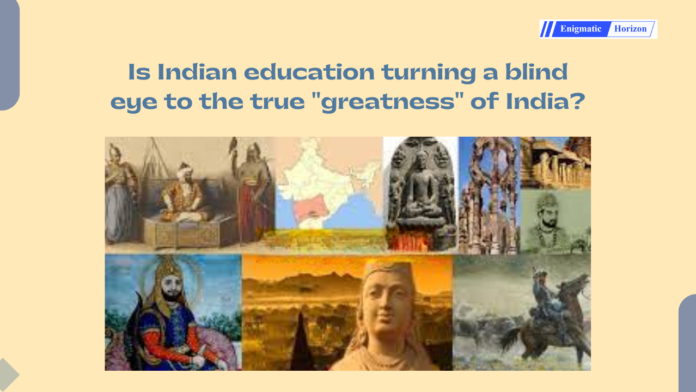Priyal Dholakia – Enigmatic Horizon Staff (Assistant Editor)
A nation’s rise to glory is determined not only by its economic reserves but also by the quality of its educational resources. It is critical to instill the right values in youth and equip them with the right mindset in order to build a promising future. And education alone has the power to awaken and mould an entire generation’s thinking in the right direction.
Today, however, we see education losing its core essence and its virtues gradually fading away from society. Textbooks, which are regarded as the foundation of school education, seem to be becoming the product of vested political interests and fabricated agendas. The true goal of education is to enlighten students and provide them with an unbiased, comprehensive understanding of the world around them. But, rather than enlightening learners, education today appears to be blinding them to the truths. Schoolbooks can be seen providing skewed, often twisted accounts of narratives. Let us see how.
History
Starting with history textbooks, one can see a lot of one-sided depiction, or rather, misrepresentation, of the facts in a variety of ways. British colonialism and the Delhi sultanates dominate history textbooks to a large extent. There is a recurring pattern of praising Islamic invaders and imperialists such as the Mughals, Mahmud Ghazni, Muhammad Ghori, and others.
India’s history has been portrayed in textbooks as a tiring tale of tyranny rather than triumph. But India’s greatness goes far beyond that. The actual greatness of India resides in the heroic kings such as the Rajputs, Marathas, Guptas, and Mauryas who made India great in the true sense. Let us look at some significant episodes that literally changed the course of Indian history but never made it into our school books.
- The maritime might of the Cholas
- Chhatrapati Sambhaji Maharaj’s 9-year-long 5-front battle and the Ultimate Sacrifice
- The Battle of Diwer 1582, and defeat of the Mughal Army by Maharana Pratap in Mewar
- The Battle of Saraighat and the defeat of the Mughals in Assam by the Ahom Empire
- The Battle of Bahraich, and the Victory of Maharaja Suheldev
- the great martyrdom of Guru Tegh Bahadur
These are just a few examples that come to mind. The vast bulk of such historical events are not covered in school textbooks.
Science and mathematics
Not only history, but children are also not taught about ancient India’s important achievements in the fields of science and mathematics. Examples include India’s development of the concept of zero, the decimal system, the 0-9 number notations, and so on. Many students are unaware of these inventions being made in ancient India. Moreover, students are taught that John Dalton is the father of atomic physics. But it is Kanad, an ancient Indian scientist, who is supposed to have discovered the atomic hypothesis. The science textbooks contain chapters about how Hippocrates, the Greek physician, gave birth to the modern system of medicine. But there is nowhere a mention of how Sushruta was the first to present the concepts of digestion, metabolism, and immunity in his book. All of this puts students in the dark about the true greatness of India.
Moral studies
During moral study classes in school, students learn the lessons of Greek philosophers like Plato, Aristotle, and Socrates. While it is beneficial to have a global perspective on philosophy, kids should also learn about Indian philosophies and values like those that Buddha, Pingala, Sariputra, and others preached. After all, learning about spiritual teachings from India will help students lead a holistic lifestyle. In addition, there is so much to learn from the Ramayana and the Mahabharata that we don’t even know where to begin.
Literature
In literature classes, students have to learn huge chunks of text dedicated to the Victorian era and Greek mythologies. But they are not taught about the defining works of Indian literature, like Abhigyan Shakuntalam, Meghdootam, Kumar Sambhavam, etc. In fact, in textbooks, Kalidas is referred to as the Shakespeare of India, and Samudragupta is referred to as the Napoleon of India, even though they were born years ahead of Shakespeare and Napoleon. This instils a subconscious desire in students to blindly ape Western culture and view it as a reference point. Even Sanskrit as a subject is being phased out in a lot of schools. Schools are seen as promoting foreign language education like French and German rather than encouraging native Indian languages.
All of these one-sided narratives may only lead to future generations losing faith in our culture. Instead of reviving and respecting our culture, they may distance themselves from it. India’s greatness is multifaceted in a lot of different fields, ranging from the arts and sciences to medicine and technology. It is important to make students aware of the contributions of ancient India in these fields. And this can happen only if the school textbooks present facts in a truthful and unbiased way.
